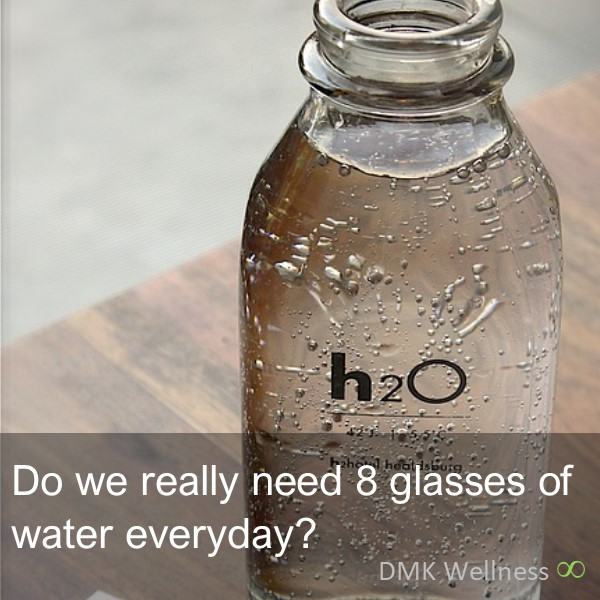Water, also known as H2O, specifically 2 hydrogen atoms and one oxygen atom is a transparent, tasteless, odorless chemical that covers about 71% of the earths surface. This substance is an essential part of life on earth. But just how much do humans need everyday to stay healthy?
How much water do we need everyday?
The exact amount of fluids recommended by the National Academies of Sciences, Engineering & Medicine in an article by Mayo Clinic, Water: How much should you drink every day? is listed below:
About 15.5 cups (3.7 liters) for men
About 11.5 cups (2.7 liters) for women
These amounts include fluids from water, other beverages and food. Twenty percent of daily fluids are thought to come from food. The other eighty percent is a mixture of water and other beverages. It doesn't really need to be all water. However, water is best since some beverages can have a diuretic effect that can also lead to dehydration.
Eight glasses of water, right for everyone?
A most common myth is that we need specifically eight, 8 oz. glasses of water everyday. The only problem with this advice is that it doesn't take into account the various factors that affect each individual's personal hydration needs. This is where it becomes a balancing act for each person to consider the factors that reduce overall hydration, those that add to it and those that affect it.
Affecting hydration
- Body types
- Environment
- Activity level
- Perspiration rate
- Health conditions
Reduce hydration
- Working out, physical exertion
- High altitudes
- Some medications with side effects
- Perspiring
- Conditions associated pregnancy
- Breastfeeding
- Not drinking enough
- Drinking alcohol, caffeinated beverages
- High temperatures in the environment
- Illness to include viral and bacterial infections, vomiting, fevers, diarrhea
Add to hydration
- Drinking water
- Eating fruits, lettuce, spinach
- Drinking herbal drinks, milk, juice
- Consuming soup, popsicles, pudding, yogurt or ice cream
- Drinking sports drinks when working out
- Drinking coffee, tea and energy drinks (in moderation)
Water is very important to the human body for a variety of factors:
- It rids your body of wastes
- Helps regulate your temperature
- Protects your organ function
- Lubricates your joints
Problems with too much or too little water
Too much
Though it's rare, you can drink too much water. This condition is called hyponatremia and it happens when your kidneys can't get rid of extra water and sodium levels in your blood are low. This is life threatening and associated mostly with athletes who take part in excessive workouts.
Too little
Without proper hydration you will likely have dark yellow urine, dry tongue, dry skin and constipation. You will also feel tired or lethargic and could be short of breath. You can develop headaches, dry mouth and nausea when your dehydration gets worse.
Working out and water
When working out you should drink fluids before, during and after your regimen. It's best to discuss your lifestyle, activity level and factors that contribute to overall hydration with your doctor or a registered dietician to determine the best amount of fluids that are right for you.
Personal hydration needs
Along with your personal physicians advice, you can also balance your personal hydration yourself by watching your daily factors that affect it - such as activities and issues that reduce hydration. Then you will want to include those dehydration busters that add to your personal hydration as noted above under the specific headings.
Sound complicated? Well, when all else fails, it might be a good idea to follow the age old way to make sure you are getting enough fluids....drink when you feel thirsty. See. Not really complicated at all. OurDMK.com
Disclaimer
The information provided by respective owner's ("we", "us" or "our) on Divorce Me Knot (referenced also as "DivorceMeKnot.com", "dmk", "DMK", "OurDMK.com", "OurDMK", "application" or "site") is for general informational purposes only and is subject to change with or without notice. All information on our site and application is provided in good faith, however we make no representation, guarantee or warranty of any kind, express or implied, regarding the accuracy, validity, adequacy, reliability, availability or completeness of any information on the site or application.
The information in articles and all content on this site should not be considered psychological or behavioral health therapy, counseling or legal, financial, real estate, mortgage, insurance or professional advice. It should not be used in place of professional advice from a counselor, therapist, physician, behavioral health professional, legal, real estate, mortgage, insurance, financial advisor or other licensed professional or credentialed expert in related subject matters. Providers of content on this site, herein known as "Contributors" (inclusive of, but not limited to writers, bloggers, editors, employees, developers, graphic designers, advertisers, partners, affiliates, references, experts, professionals and site owners) are not legally liable for any misinformation, errors or omissions.
Under no circumstances should DMK and/or it's Contributors have any liability to users of the site for any loss or damage incurred to users as a result of the use of this site or application or reliance of any information provided on the site or application. Use of the site or application and reliance on any information from the site or application is solely at the user's own risk.
For complete site disclaimers review "Disclaimers" on this site or click the link below.
Read Complete Site Disclaimers Here



 How to resolve AdBlock issue?
How to resolve AdBlock issue?